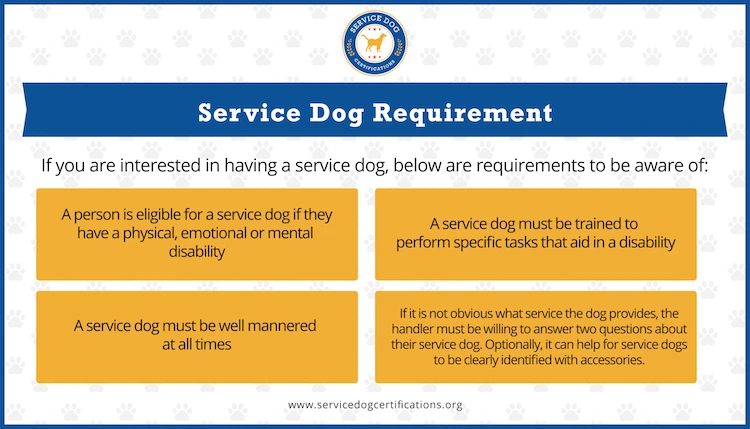Home Page › Blog › Can You Get a Grant for a Service Dog?
Can You Get a Grant for a Service Dog?

Dogs are helping humans in many ways. For individuals with disabilities, dogs can perform tasks to assist them with daily tasks the handler could not do by themselves. These service dogs can greatly improve their owner’s life or even perform life-saving tasks. However, a good service dog comes with a cost. In this article, we’ll look at the possibilities of getting a grant to sponsor a service dog.
The Price of a Service Dog
Because the work service dogs perform is so vital, a service dog’s cost can be steep. The price depends on the service dog’s breed and training, but a trained service dog from a reputable organization can cost 10,000 to 40,000 dollars. Little Angels Service Dogs, a non-profit that sells service dogs, estimates their service dogs cost about 38,000 dollars to train. Although it’s possible to train your service dog, finding the right dog and putting in the time and effort to teach them can have its costs. And unfortunately, it’s not guaranteed that the dog you choose to train will be able to perform the tasks you need in the end.
Obtaining a Grant for a Service Dog
To help mitigate the cost of a service dog, many service dog agencies offer grants. These organizations are usually non-profits, foundations, or businesses that assist people who are disabled and need a service dog. Most of these agencies require that you apply and give verifiable documentation of your disability to qualify for a grant.
A grant is not a loan; it doesn’t require repayment to the people you received the grant from. Some organizations receive donations from the public or funds from the government to obtain and train service dogs, and grants are used in place of cash payment for these dogs from the person in need. Some grants may cover the full cost of a service dog, while others may provide partial payment, and the recipient of the dog must cover the rest. Applying doesn’t always guarantee a service dog, but the process is straightforward.
Steps to Get A Grant for a Service Dog
1. See a Doctor
Before starting the process of seeking a grant for a service dog, you should speak to your doctor. Most organizations will require a letter or prescription from your doctor stating that a service animal can help you manage your disability. Your doctor should note what type of meaningful assistance the service could provide to mitigate the issues caused by your disability.
2. Look for an Organization and Apply
Luckily, some organizations exist to help people with disabilities obtain a service dog. A few organizations cater to a particular location or demographic (for example, veterans), so it’s a good idea to investigate the organization before applying. Look for reputable agencies with good reviews, and don’t be shy to ask other people for their opinion.

Here are a few reputable organizations that offer grants for service dogs:
NEADS
NEADS is a highly reputable organization with a long history in the service dog industry. Although the service dog’s cost is free, each client must agree to fundraise $8,000 with the help of NEADS fundraising kits and resources. NEADS offers service dogs for children, veterans, and adults who are hearing impaired.
Patriot Paws
Patriot Paws work with military veterans to connect them with the right service dog to help with their disability at no cost. Although all veterans may apply, priority goes to Desert Storm veterans.
Paws with a Cause
Paws with a Cause is a non-profit which operates through public donations. Service dog applicants pay a nominal fee to apply for a service dog. If approved, service dogs are provided at no cost. To qualify, applicants must have a physical disability, seizure disorder, a hearing impairment, or have a child with autism.
Who Gets a Grant?
Technically, grants go to organizations, not individuals. This is why people seeking a service dog must apply to a non-profit or business to receive a service dog funded through grants. Remember that you may not receive a service dog immediately and may need to apply to many organizations. Part of the application process requires verifying your information, and a field agent may come to your home to evaluate whether it’s safe for a service dog.
Note that the yearly costs of a service dog from grooming, veterinary fees, and food are often not included. Therefore, the recipient must have the financial ability to provide for the service dog for the years to come.
About the Author: The writing team at Service Dog Certifications is made up of folks who really know their stuff when it comes to disability laws and assistance animals. Many of our writers and editors have service dogs themselves and share insights from their own experiences. All of us have a passion for disability rights and animals.
Latest Posts

How to Bring a Service Dog to Disneyland
Trained service dogs are more than welcome to join their handlers at Disneyland. In this guide, we’ll explain Disneyland’s policies and give practical advice for bringing a service dog to Disneyland for the first time. Disneyland’s Service Dog Policies The Magic Kingdom is happy to welcome trained service dogs across most park locations! They kindly […]

Read More

Can Dogs Eat Tomatoes?
Yes! Dogs can safely enjoy tomatoes, but there are a few risks to be aware of so you can feed your dog responsibly. Fully ripe tomatoes (without the stems and leaves) can actually have nutrients that are good for your pup. Tomatoes have chlorogenic acid, an antioxidant that can have anti-inflammatory effects in cells. They’re […]

Read More

Can a Primary Care Doctor Write an ESA Letter?
Your family doctor, also called a primary care physician (PCP), can write a letter recommending an emotional support animal. We’ll explain what legally gives them that ability and explore what better options might be available for you. Why are Physicians Able to Write an ESA Letter? To turn your pet into an emotional support animal, […]

Read More








I have type two bipolar disorder and OCD along with severe anxiety and severe depression. I’m currently in the process for approval from my psychiatrist to get the approval for a service dog, my therapist has already recommended the need for one. Is there any grants I would be able to receive for a psychiatric one that could travel with me to college? I’m new to this and don’t really k now anyone with a service dog…
Would someone that is 70 and has MS and diabetes be considered?
There are no age limitations when it comes to who can own a service dog. The important criteria is that the person has a health condition that is an eligible disability and has a need for a task-trained dog to assist with that disability.
I have hemiplegic migraines. It’s a rare neurological disorder that looks like a seizure and ends like a stroke and I also have type 2 diabetes. Whenever my blood sugar gets too high or too low I tend to pass out. Would my disabilities be considered an eligible disability for a task trained dog that could assist with my disabilities?
The criteria for having a disability under the ADA is whether your impairments “substantially limit one or more major life activities”. If your condition substantially limits your ability to function in an aspect of daily life, you may qualify. We recommend speaking to your healthcare professional about your specific condition and needs. The other consideration is whether your condition would be helped by a dog performing a specific task or job. That could be another point of discussion between you and your healthcare provider.
My therapist recommended that I get a service dog for depression anxiety and panic attacks and depression
I’m 62 with severe anxiety and depression I’m not a veteran just a lady who worked hard to take care of her family who needs a puppy who can help me not go into the anxiety spiral I’m poor live month to month I need something to help me get through each day
You may want to speak to your healthcare provider about whether an emotional support animal or psychiatric service dog could help you: https://www.servicedogcertifications.org/psychiatric-service-dog/
Hello my service dog of 13 yrs just passed away a week ago I have seizure disorder sleep apnea,I am trying to get another service dog or help with training another one and hope soon because I also have PTSD which when my anxiety gets to high i endurance having seizures my previous girl helped me live a better stable life i am afraid my health will deteriorate and take me back to where i can’t function if any one knows where i can get assistance please help.